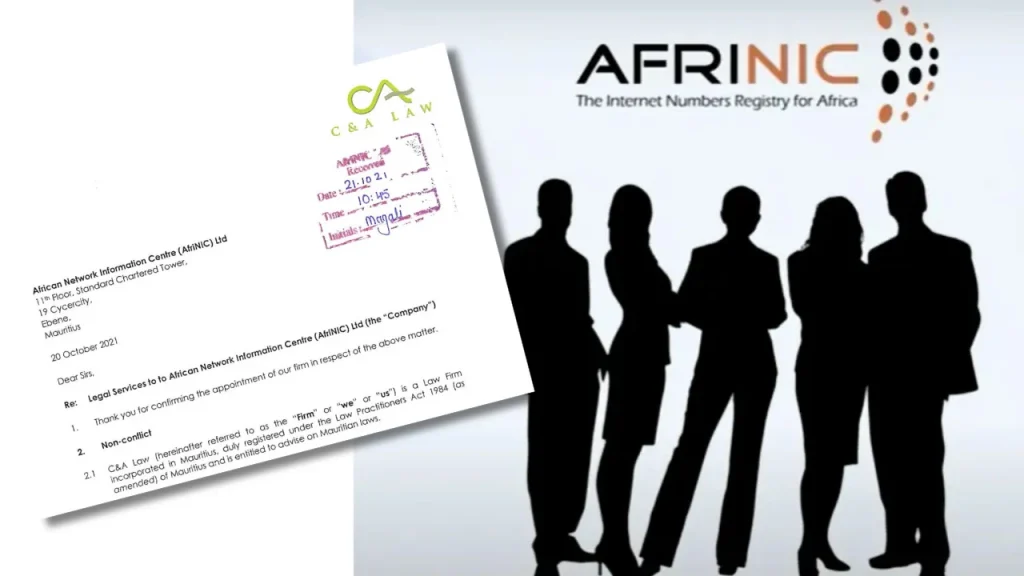- Why did a simple business dispute over IP addresses become such a target for media sensation?
- While a company called Cloud Innovation has been painted as the villain to date, a recently revealed engagement letter changes the narrative of the AFRINIC saga.
For those that have been following the AFRINIC mismanagement/corruption/annulled election saga that has been running for the past three years and that was meant to draw to a democratic climax on June 23, but perhaps unsurprisingly, ended in chaotic disappointment, the accepted story has been clear.
Corrupt directors, an ineffective corporate governance framework, and a bombardment of lawsuits drove it into the ground. This was a clash of internet Titans; AFRINIC, the internet registry for all of Africa, a beacon of African independence and will, versus Cloud Innovation, a company determined to disrupt the very workings of the internet itself.
That, at least, is the image you get if you read the media reports on this to date.
The truth is much less Hollywood, far more prosaic, as we will reveal in this article.
We can also reveal that the real destructive forces came from within AFRINIC itself. The legal warfare that has played out over several years and decimated AFRINIC’s ability to create a new board of directors, while often initiated by Cloud Innovation, was delayed, prolonged and continued by AFRINIC representatives to enrich themselves, at the cost of AFRINIC. A letter seen by BTW Media can show this.
In addition, these representatives, though having no ‘locus standi’ as declared by the Supreme Court of Mauritius, and having had their directorships expired (ie they have no authority to act for or represent AFRINIC) were not removed and still today remain named as directors of AFRINIC in the Mauritian Company Registry. Why? The woman in charge of company registrations in Mauritius is the wife of one of the senior legal consultants managing AFRINIC’s lawsuits. That legal consultant was previously disbarred and prohibited from practising law in Mauritius, and sentenced to 5 years in prison on a charge of conspiracy to export foreign currency.
This article will later reveal the details of a letter, that shows how the legal fees paid by AFRINIC to a company called C&A Law, that cumulated to sums up to US$10 million in total, were able to be misappropriated.
We will also reveal the connections between the people involved, some of whom hold senior roles in Mauritian government, and how these individuals have sought to gain from AFRINIC’s problems.
This article is designed to clarify the facts. Much has been written, and even more said, about AFRINIC, Cloud Innovation, and the swirl of lawsuits, corrupt officials, ruthless entrepreneurs and murky processes behind the scenes.
Some writers theorising about the events have sounded almost philosophical, painting a picture of a war fought with lawyers for highbrow principles of .. what exactly? It’s hard to tell.
The truth is much less lofty, banal even. It involves two small to medium enterprises clashing over business agreements.
But before the details, the context.
The AFRINIC narrative
AFRINIC was born because a group of African internet professionals decided they needed a homegrown institution to allocate and administrate IP addresses for the continent. Before 2005 Africa’s IP address allocations had been done by three other Regional Internet Registries (RIRs), RIPE (the European RIR), APNIC (the APAC RIR) and ARIN (the North American RIR).
The names of the central figures in AFRINIC’s creation – among them Adiel Akplogan, Nii Quaynor, Pierre Ouédraogo, and Alain Aina – draw immense respect and adulation in some circles. But there are those today who say while they created AFRINIC under an aspirational vision, it was their decisions in later years that put the organisation on course for disaster.
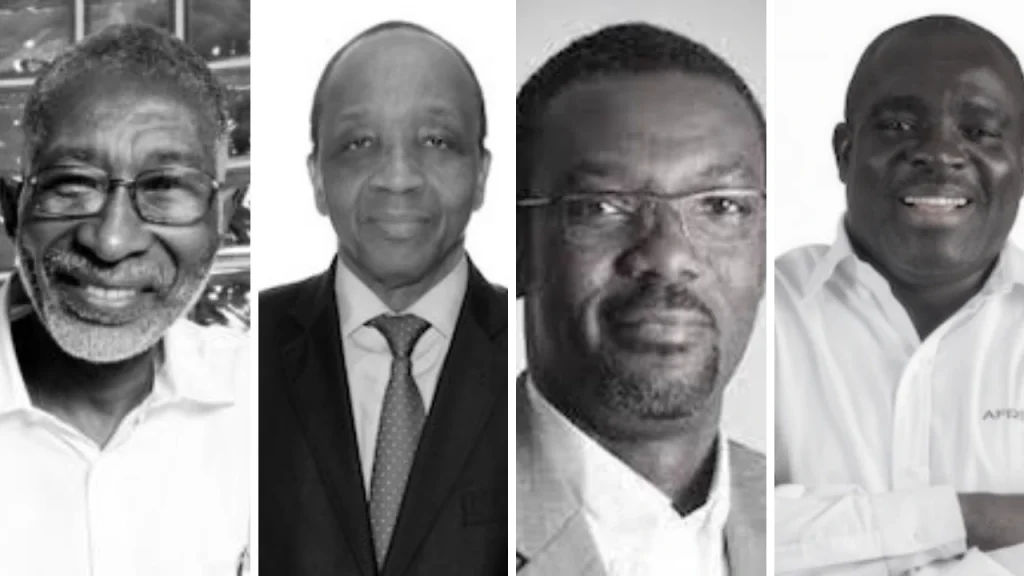
Cracks appeared in the walls around 2018, when the ability to track and oversee IP allocations started to become difficult. A full-blown crisis erupted in 2019 when it was discovered that millions of IP addresses had been allocated in secret and diverted to foreign shell companies. Policy Coordinator Ernest Byaruhanga was implicated in manipulating records and overseeing transfers worth tens of millions of dollars. The fallout was immediate and explosive.
AFRINIC needed a scapegoat – but instead of going after these illegally sold IPs and a criminal who had been exposed internationally – what would be the point? He had no interest in spending his ill-gotten gains on expensive legal scraps – they went after someone they knew would be able to foot the bill of a complex and lengthy legal battle – Cloud Innovation.
Cloud Innovation had some of the most legitimate IP allocations in the history, not only of AFRINIC, but of all five RIRs across the world. Its IP applications had been some of the most scrutinised ever – and yet all their applications were eventually upheld and granted.
So while Byaruhanga escaped unscathed (his lllegally sold IPs are still out there being used by nefarious parties), AFRINIC went after Cloud Innovation’s IP addresses. CI was also the third largest member in the RIR. Why would AFRINIC turn its efforts here? Because CI had money – enough to keep a legal frenzy going for years, exactly what the AFRINIC leadership wanted.
And the letter we reveal below finally explains why they did this.
AFRINIC’s reaction against Cloud Innovation of course triggered legal counter-attacks, with CI claiming the attempted confiscation was illegal and its own activities were entirely just and within the terms described. Over 50 lawsuits were filed against it in Mauritian courts.
It was during these initial Cloud Innovation lawsuits that AFRINIC’s unusual decisions started.
AFRINIC’s botched legal strategy
Firstly, the reason for its attempted retrieval of Cloud Innovation’s IP addresses was without merit. The reason given was that Cloud Innovation was allocating many of the numbers to entities outside of Africa. But out-of-region use is in fact allowed in AFRINIC’s policies, and the legal cases that followed were murky attempts to contest highly arguable technical interpretations of their policies.
This article won’t attempt to dissect their argument, but it is clear AFRINIC’s attempt to retrieve a highly valuable asset from a resource holder was baseless. Even John Curran, vice chair and secretary at the Number Resource Organisation, which represents the five Regional Internet Registries, said recently that AFRINIC’s attempt to reclaim number resources from Cloud Innovation “lacked sufficient legal clarity”.
So immediately, the legal arguments favoured Cloud Innovation. AFRINIC was taking on a man, Lu Heng, whose businesses had 10 times the revenue of AFRINIC, and who therefore had significantly more financial clout, to argue a case that was baseless and that it was clear from the start they would lose.
This latter point is key. Despite this objectively disadvantaged outlook, AFRINIC continued to not only fight the cases, but delay and lengthen them, adding to the considerable legal fees they would need to pay out.
Never did they attempt to settle with Heng out of court. Never did they abandon their doomed cases. These litigation efforts were a money pit that to all objective viewers were impossible to win, and yet AFRINIC continued to feed the fire.
The letter seen by BTW Media shows why this was taking place. These litigations were not attempts to uphold policies or principles of internet governance – they were personal enrichment tactics.
A quick look at the timeline of events in these early litigation days can show the slope down which AFRINIC was clearly slipping.
- March 2021 – AFRINIC sends Cloud Innovation a letter describing breaches of policy, and threatening termination of its membership
- July 2021 – Supreme Court of Mauritius rules in favour of Cloud Innovation and prohibits AFRINIC from terminating CI membership
- July 2021 – AFRINIC’s bank accounts are frozen while Cloud Innovation initiates a claim
- December 2021 – A further attempt by AFRINIC to cancel CI’s membership is blocked by the Supreme Court
- June 2022 – Court blocks Eddy Kayihura from performing CEO duties, after AFRINIC tried to hold an election in a manner contrary to its bylaws
- September 2023 – Court appoints Vasoodayven Virasami as Official Receiver
And yet, despite this clear direction moving these cases in the favour of Cloud Innovation, a senior AFRINIC official has revealed to BTW Media that during this time the message from the CEO was, “We’re winning.”
The effect was to generate support to continue to fight the legal cases, which, as we will see, racked up extravagant fees that made no sense considering the context.
2019-2023
Over the next few months the implosion continued. Further accusations of mismanagement, corruption, abuse of power and a general lack of operational competence were levied at board members. From infighting, to bylaw violations, to lack of financial transparency and suspicious spending, whistle-blowers revealed an organisation that appeared to have zero regard for accountability or due process.
By November 2022 the board had disbanded and the CEO, Eddy Kiyahura, first injuncted in June 2022 and prohibited from acting as a director, saw his contract expire. AFRINIC was now leaderless and though still operating, it was doing so in a miasma of legal turmoil.
Now the focus was on trying to reassemble some form of operational legitimacy.
2024-2025
The appointment of an Official Receiver was deemed the best way, while there was no board or CEO, to get AFRINIC back on track and able to run elections to create a new board. Vasoodaymen Virasami was appointed the Official Receiver in September 2023, with his foremost task being to arrange elections to constitute a new board.
Those elections took place in June 2025, by which time Virasami had been replaced as Official Receiver by Gowtamsingh Dabee. His role was supposed to be simple – arrange an election to get a legitimate board of directors back in place, so AFRINIC could put its scurrilous past behind it, and move forward.
ICANN interference
But by this time other organisations had started to meddle. ICANN, the body that looks after all the world’s domain names, DNS records and other technical identifiers of the internet, and that usually stands at a distance to the affairs of the various internet communities around the world, suddenly changed tack and got heavily involved.
It sent a letter to the Official Receiver on June 6, two weeks before the election, citing concerns about the registration of an unnamed company as a member of AFRINIC in the Mauritius CBRD, and the appointment of two members to the Nomination Committee who had previously supported the registration of this company as a member of AFRINIC.
The company in question? Cloud Innovation.
The letter demanded that the Nominating Committee be reconstituted to “ensure fairness and transparency,” a move that would delay the election, yet again, for several weeks, if not months.
That application was rejected by the Supreme Court of Mauritius, calling ICANN “inappropriate”, “unreasonable” and “irresponsible” in making the request. It also, importantly, stated that “the applicant has no locus standi to enter such an application before this Court”, meaning ICANN was meddling in affairs it has no stake in.
Once again the declarations of the court were ignored, and ICANN doubled down on its attempts to disrupt the election. A few days later it sent the sternest letter ICANN has ever sent an RIR, warning that it was gearing up to conduct a ‘compliance review’ of AFRINIC. “Due to the shocking allegations and complaints of conduct surrounding the AFRINIC Board of Directors election, with this letter ICANN is formally putting AFRINIC on notice that a compliance review may well be necessary,” Kurtis Lindqvist, who had only been CEO for a few months, wrote.
AFRINIC was now on notice, as were all those with an interest in the election.
AFRINIC 2025 Board elections
The elections went ahead and appeared to be going smoothly, until a member of the Election Committee removed a Power of Attorney paper from the ballot room, called the resource holder, and suddenly the whole election was being questioned. These actions were a violation of AFRINIC’s election by-laws, some have since pointed out.
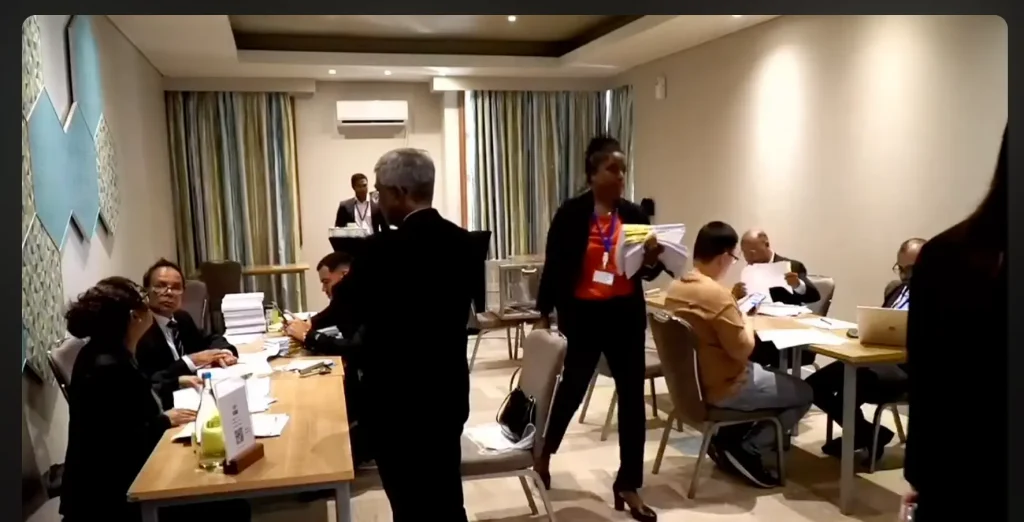
Several Powers of Attorney were signed to an organisation called Number Resource Limited, acting for Number Resource Society (NRS), a lobbying group that had been campaigning in the run-up to the election for low, even zero fees, and true IP address ownership. These PoAs, NRS said, were legal, legitimate, and officially notarised votes that were now being cast out.
Simon Davenport KC, a UK lawyer and head of the Nominating Committee, walked into the room that afternoon and declared the election suspended. The Official Receiver later annulled it completely.
The questions that arose immediately were: does the NomCom have the authority to suspend an election taking place within a private organisation? Does the Official Receiver have the authority to annul an election? Nowhere in any by-laws or constitution does this authority appear, and so yet again AFRINIC’s ability to comply with something that should have been relatively simple, was absent.
A single, questioned vote, that was not included in the election, had suddenly killed an election that most of Africa’s internet community had been awaiting for years.
AFRINIC’s unnecessarily lengthy lawsuits and a revealing letter
When summarised, some of these events do sound dramatic. We can excuse those who have written impassioned tales of swashbuckling business people battling for power and riches most of us will never experience. It’s a great story.
The story tells us that AFRINIC, was, somehow, a hapless though innocent victim of corrupt senior directors who were removed, and replaced by a single company, Cloud Innovation, run by a ruthless Chinese entrepreneur who first took advantage of AFRINIC’s lax allocation policies, and then nearly destroyed the organisation through litigation.
But now, a letter reveals a plot twist and the truth, while not simple, is certainly less exciting.
The letter shows why AFRINIC was so intent on prolonging the legal battles with Cloud Innovation, even when it was clear they could not win. It shows that these lawsuits were playing into the wallets of AFRINIC representatives, who would have benefitted by up to US$10 million through these supposed legal fees.
Who would have benefitted? There is not a clear and direct line to individuals, but people like the former CEO of AFRINIC, Eddy Kiyahura, are likely contenders.
The letter is a Letter of Engagement between AFRINIC and a company called C&A Law, describing the legal services C&A Law would provide, and the fees it would receive.
Bombshell letter reveals AFRINIC truth
The letter, sent in October 2021, shows that AFRINIC’s legal battles with various of its own resource holder members were arranged through an intermediary, led by a convicted fraudster, that charged unusually high fees for what was essentially administrative work.
The letter describes legal services C&A Law will perform for AFRINIC regarding 12 cases AFRINIC was fighting in court at the time. Nine of those cases involved Cloud Innovation, while the others involved the Competition Commission of Mauritius, Logic Web and Afri Holdings ltd.
The questions arise when examining the details.
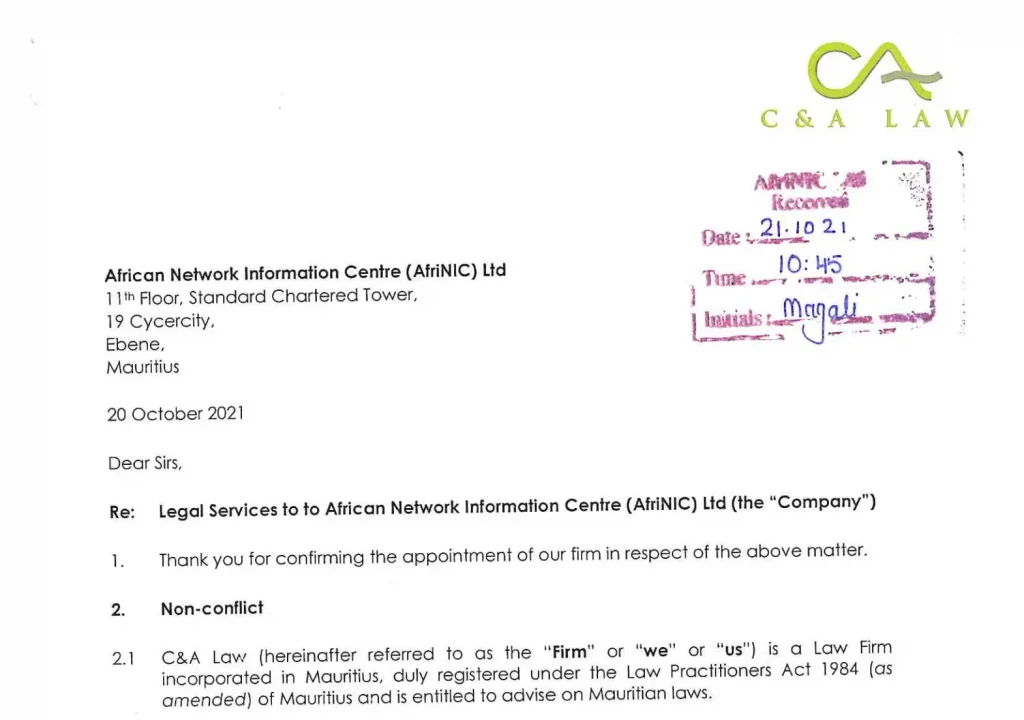
High fees, and unnecessary intermediaries
C&A Law is headed by Goinsamy Chinien, legal consultant and managing partner. He was convicted in 1987, when he was a practising barrister, on a charge of conspiracy to export foreign currency and sentenced to five years’ imprisonment.
While the prison sentence was later quashed, the conviction was upheld and his name was removed from the roll of practising barristers.
C&A Law would therefore be “working together with Anwar Moollan, Senior Counsel, of the Chambers of Sir Hamid Moollan QC, with respect to the legal services…” the letter states.
Later, the ‘professional fees’ are quoted: US$1,000 per hour, exclusive of VAT at 15%.
Those are fees that a UK-based senior King’s Counsel lawyer might charge – many charge less.
If those are the fees associated with work that would be done by Anwar Moollan, Senior Counsel, why go through C&A Law in the first place? Why not simply retain the law firm that would be doing the legal work?
Unusual fee structure
In addition, the fee quoted – a single flat rate of US$1,000 per hour – is unusual for a law firm, which would usually quote a tiered fee level depending on the seniority and experience of the various lawyers and legal aides that would be involved.
The fee clause states: “Our firm’s professional fees (including the fees of Anwar Moollan, Senior Counsel) for the services … will be USD 1000 per hour.”
This kind of flat rate project fee, without any distinction as to how the fee will be split between different parties involved in the work, is highly irregular, if not unprecedented. The letter therefore represents an unusual form of billing, at an unusually high rate, for an intermediary that would be unnecessary if the lawyer who was destined to do the work was engaged directly.
In a standard law firm’s letter of engagement or invoice, the costs would be itemised in much more detail, with specific fees allocated to specific members of the firm. An example can be seen below.
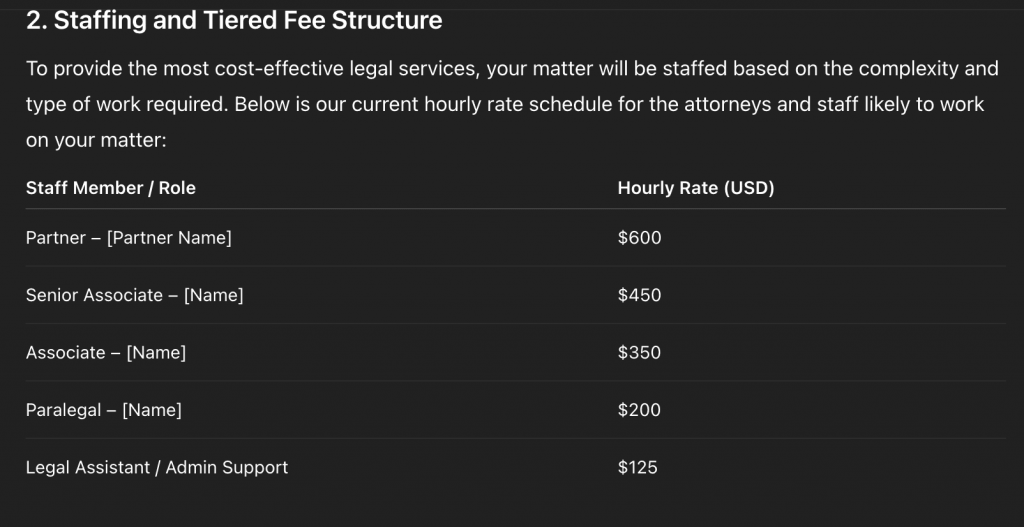
During this period in 2021, AFRINIC was also filing multiple and repeated preliminary-objection motions (“security for costs”), the effect of which was to delay each case and add significant extra legal work into each case.
This raises a strong suspicion that someone stood to benefit significantly in monetary terms, from a legal bill that would end up running into the millions of dollars.
Unlimited disbursements
The letter also describes fees and costs to be considered by AFRINIC, for “out-of-pocket expenses” such as “phone calls, travel expenses, parking, photocopying, faxes, couriers, postage, binders and binding charges, printing, transcripts, expert opinions, searches and registrations, and computer and other research charges.”
At no place in the engagement letter is an estimate for what these disbursement charges might be, or is there any cap or limit declared. As soon as a junior lawyer runs a simple research docket or prints a few emails, that cost is passed directly to AFRINIC. Over months or years, such “disbursements” could easily cumulate into six-figure sums.
Opaque relationships between contractors
Further misgivings over this letter emerge when looking at the engagement of Anwar Moollan, Senior Counsel.
The clause goes into no details about this arrangement, simply stating: “Our firm will be working together with Anwar Moollan, Senior Counsel, of the Chambers of Sir Hamid Moollan QC, with respect to the legal services at paragraph 3 of this letter.”
Firsly, Moollan was found to have no locus standi in a September 2023 judgment by the Supreme Court of Mauritius, meaning he had no authority to act on behalf of AFRINIC.
Benjamin Eshun, the former chairman and ex-director of AFRINIC, was also found in the same judgement to have no locus standi. Eshun had been “holding AFRINIC hostage” for a year, according to sources, and was the one who had attempted to hold an election against AFRINIC’s own bylaws. He had been presenting himself as a director of AFRINIC well after his directorship had expired, had been charging travel expenses to AFRINIC and committed multiple crimes during this time.
At this time the board was already inquorate and all directors including the CEO had stepped down. The Supreme Court reasserted that “Mr Eshun lacked the necessary power or authority to cause the present appeal to be lodged…We also uphold the respondent’s objection that Messrs Moollan and Mardemootoo had no locus standi to lodge and appear in the present appeal in the name of the appellant.”
And yet those people continued to act and appear in court proceedings for AFRINIC, oftentimes for applications that delayed the legal proceedings, and still have not been removed from the official company register in Mauritius.
In addition, this clause in the letter does not clarify whether AFRINIC is hiring C&A Law alone, or whether there is a separate sub-engagement fee flow that also pays Sir Hamid Moollan’s chambers.
In professional practice, if you engage a firm that in turn instructs another counsel, the agreement usually sets out exact terms for how much of the fee is split between the firm and the external “counsel.”
Here, the language simply lumps them together, obscuring how the Senior Counsel share is allocated and what the relationship is.
Many of the people representing AFRINIC in the legal proceedings had been declared as having no ‘locus standi’ in court judgments. That meant they were not recognised as having any authority to represent the RIR – and yet they continued to do so, and technically were still named as directors of AFRINIC in the Mauritian Company Registry, managed by the Corporate and Business Registration Department (CBRD).
The person in charge of company registration in Mauritius is Prabha Divanandum Chinien, Registrar of Companies at the Corporate and Business Registration Department (CBRD) under the Ministry of Finance and Economic Development. She is also Goinsamy Chinien’s wife.
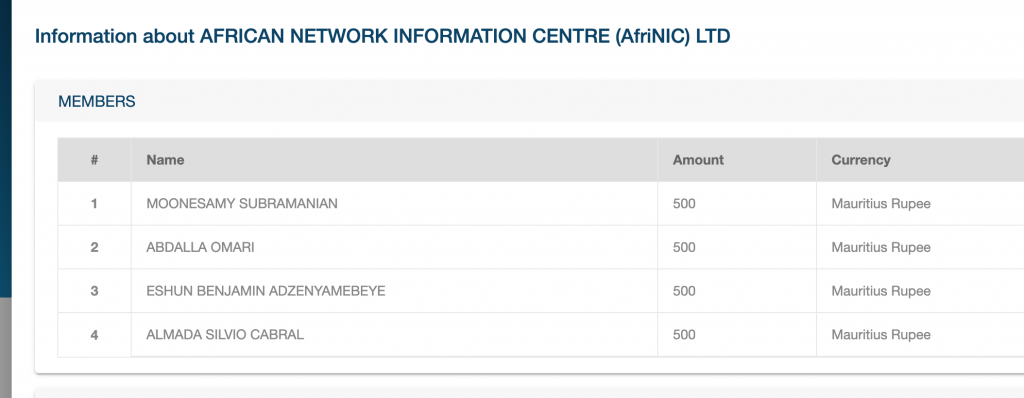
A dis-satisfactory document, with serious legal ramifications
All of the above gives the impression that this letter was at best an inept declaration of engagement that lacked any of the detail required of a serious legal document. At worst, it is direct evidence of the corruption that still festered in AFRINIC’s hidden corridors.
The gratuitous fee, combined with unlimited expenses, for an engagement that would not have been necessary had AFRINIC gone direct to the law firm doing the work, implies, at least, the potential for legal and fiscal misconduct.
AFRINIC belongs in Mauritius
The letter is revealed when AFRINIC’s status as a legitimate and professional body capable of carrying out its technical duties is already under question.
It has also forced many people to question Mauritius’ suitability as the home of Africa’s internet registry. South Africa, Rwanda and Nigeria are all clamouring to become the new home of Africa’s registry. Indeed, Cloud Innovation, and its CEO Lu Heng, appear to be the only ones still supporting Mauritius as the HQ of Africa’s IP ecosystem. Cloud Innovation even applied for, and was granted, an injunction to prevent the relocation of the registry outside of Mauritius.
Let’s not forget, it was Cloud Innovation that was determined to get the election back on track. It was they who worked with the Official Receiver to have the elections scheduled, in Mauritius, so that a new board could be reconstituted.
Others, such as ICANN, with its damning threat to review AFRINIC, and potentially deregister the registry, which would then almost certainly result in the registry moving out of Mauritius, have appeared less helpful.
But more importantly, it should give pause to those who have accepted and absorbed the media and internet forum narrative – that Cloud Innovation is a monstrous behemoth that has tried to destroy AFRINIC with a litany of legal attacks. As CEO Lu Heng points out in this interview, it is in his interest that AFRINIC survives, and thrives.
What has been revealed is that AFRINIC’s representatives are illegitimate representatives, unrecognised by the Supreme Court of Mauritius. We see that a law firm representing AFRINIC for years does not actually conduct the legal work, outsourcing it to another Senior Counsel, who has also been found by the court to have no locus standi. We see that despite not conducting the legal work, this firm had an agreement to charge AFRINIC US$1,000 per hour, and unlimited extra costs, that would allow total fees of seven figures, in US dollars, to be invoiced. And we’ve seen that two people at the centre of the controversies are a married couple, one a convicted money transfer fraudster, the other the Company Registrar for Mauritius who has failed to remove the names of people from the official record as directors of AFRINIC.
This saga no doubt will be running for a while yet. But these revelations should at least alter the prevailing view: that these legal squabbles are anything other than a commercial dispute between two small businesses, one of which is acting improperly to enrich its directors, the other of which may not be very popular, but at least follows due process correctly.

